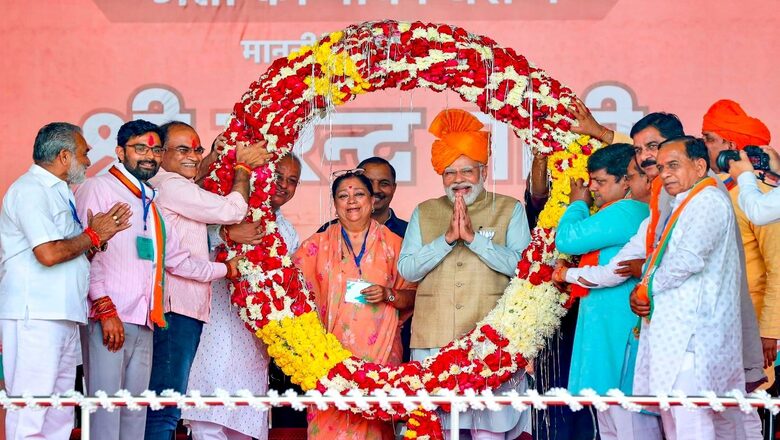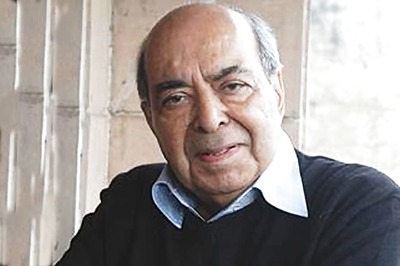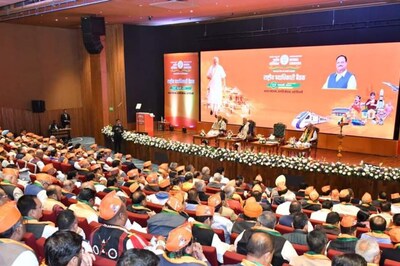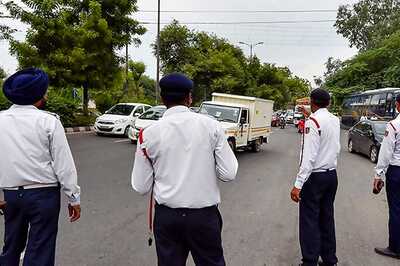
views
Amidst the intricate tapestry of Indian politics, the captivating state of Rajasthan has become a veritable battleground, where the art of strategic manoeuvring and political finesse reign supreme. In the realm of Indian politics, the Bharatiya Janata Party (BJP) has earned a reputation for its formidable organisational prowess. With a meticulous approach, the party is currently spearheading a carefully planned campaign that spans from the grassroots level to the grand political stage. One cannot help but be in awe of the intricate roadmap the BJP has created for the upcoming Rajasthan elections as the electoral drama plays out. It is a tapestry woven with threads of meticulous planning, charismatic leadership, and an astute understanding of the electorate’s pulse.
The Congress, along with its ecosystem, has astutely constructed the narrative that the BJP’s predicament in Rajasthan stems from internal strife and the marginalisation of former chief minister Vasundhara Raje. The ecosystem also attempted to generate the notion that the party’s performance would suffer as a result of the leadership crisis. The preponderance of opinion polls, however, have already refuted this viewpoint. That is why a look into the strength of the BJP with respect to Rajasthan is indeed necessary.
A Resilient Organisational Framework
The organisational prowess of the BJP stands as the cornerstone of its electoral game plan. In the vast expanse of Rajasthan, the party boasts an extensive web of karyakartas, those dedicated foot soldiers who toil tirelessly at the grassroots level. This network stretches its reach to the farthest and most secluded corners of the state, serving as a formidable backbone for the party’s well-oiled campaign machinery. In a remarkable display of strategic prowess, the party has cultivated a robust organisational structure that leaves no stone unturned in its quest to disseminate its message far and wide. This carefully constructed framework guarantees that the party’s voice resonates with every single voter, forging an intimate and meaningful bond that fosters a deep sense of personal connection and unwavering engagement.
The Modi Factor: Capitalising on Charisma
In the ever-evolving realm of politics, it is an unfortunate reality that the captivating allure of personalities often eclipses the crucial importance of policies. In this intricate dance of power and influence, the spotlight is frequently fixated on the individuals who occupy the stage, while the substance of their proposed measures and initiatives fades into the background. This phenomenon, though not entirely surprising, raises pertinent questions. In a shrewd move, the BJP appears to have astutely recognised the prevailing circumstances and is now strategically positioning itself to leverage the immense popularity enjoyed by Prime Minister Narendra Modi.
Through a carefully orchestrated sequence of planned rallies, his charismatic appeal has been unleashed, captivating audiences across the state. In the realm of political figures, Narendra Modi transcends the mere role of a face plastered on campaign posters. He embodies something far more profound—a potent symbol of leadership that strikes a chord with an incredibly diverse electorate. The BJP possesses a remarkable knack for harnessing the power of the ‘Modi factor’ which sets it apart from other political parties. By skillfully tapping into the electorate’s emotional and aspirational sentiments, the BJP has managed to carve out a distinctive position for itself.
Hindutva Appeal Against Growing Community Violence
In the ever-evolving landscape of public discourse, the strategic deployment of ideologies emerges as a formidable force that wields significant influence over the shaping of public opinion. The BJP has been employing a focus on Hindutva, effectively tailored to strike a chord with a significant portion of the voting populace. The ideological stance in question, despite its inherent controversies, has undeniably demonstrated its efficacy as a formidable electoral tool throughout history. The BJP’s remarkable ability to align itself with the sentiments associated with Hindutva adds a fascinating layer of intricacy to the electoral equation, potentially influencing the dynamics of voting in its favour. The party’s strategic playbook, while undoubtedly effective, has not been without its fair share of controversy.
One crucial element of its electoral strategy revolves around highlighting concerns regarding communal violence within the state. In a skillful manner, it constructs a narrative that draws connections between these incidents and the perceived appeasement politics of the Ashok Gehlot government towards a particular community. In a move that carries significant implications, political actors have adopted a tactic that serves a dual purpose. On one hand, it aims to consolidate the Hindu vote base, while on the other, it intentionally fuels polarisation among the electorate.
Anti-Incumbency Dynamics: The Historical Advantage
The political pendulum of Rajasthan swings to the rhythm of anti-incumbency, a phenomenon that has defined the state’s electoral landscape since the 1990s. This deep-rooted trend presents an opportune moment for the BJP, as the electorate’s yearning for change aligns perfectly with the party’s aspirations to reclaim power. After five years of the Congress rule, a palpable sense of discontent pervades the air, paving the way for the BJP’s narrative of renewal and transformation.
The party astutely positions itself as the antidote to the perceived stagnation that has set in under the current dispensation. This strategy of embracing change resonates with the electorate’s desire for a fresh start, a sentiment that often intensifies as the tenure of a single party extends.
The BJP’s electoral playbook is carefully crafted to exploit the anti-incumbency advantage. The party relentlessly highlights the perceived shortcomings of the Congress government, focusing on issues such as unemployment, corruption, and administrative apathy. These targeted attacks aim to erode public confidence in the incumbent administration and reinforce the need for a change in leadership. The BJP’s strategy is not merely about exploiting the anti-incumbency factor; it also involves presenting a compelling vision for Rajasthan’s future. The party promises to usher in an era of economic prosperity, social progress, and efficient governance, appealing to the aspirations of a populace seeking a better tomorrow.
Whether the BJP can successfully capitalise on the anti-incumbency wave and translate it into an electoral victory remains to be seen. However, the party’s strategic manoeuvring and its ability to tap into the electorate’s desire for change has undoubtedly placed it in a strong position to challenge the Congress government in the upcoming elections.
Capitalising on Internal Dissent
Masters of political strategy, the BJP demonstrates a shrewd ability to capitalise on internal dissent within the Congress party. The forthcoming elections in Rajasthan provide a fertile ground for the BJP to amplify the recent criticisms levied by Congress dissident Sachin Pilot against Chief Minister Gehlot. Pilot’s vocal stance, especially regarding issues of corruption and the reluctance of the Gehlot government to take on corruption that allegedly took place during the previous BJP government, becomes a strategic tool for the BJP to sow seeds of discord within the Congress ranks. By highlighting internal dissent, the BJP aims not only to weaken the unity of its primary political opponent but also to present itself as a party that remains united and cohesive.
This calculated move transcends the immediate electoral context, positioning the BJP strategically in the larger political narrative. The emphasis on internal discord within the Congress serves to create an image of disarray and lack of leadership, contrasting it with the BJP’s portrayal of stability and unity. In this intricate political dance, the BJP skillfully transforms internal dissent within the Opposition into a tactical advantage, further strengthening its position as a formidable force in the upcoming elections.
Governance Matters: Accountability and Allegations
The BJP’s narrative seamlessly transcends ideological battles, delving into the realm of governance with a focused objective. Its sights are set on holding the Gehlot government accountable, specifically in matters of law and order, particularly concerning crimes against women. This narrative aligns with the broader image the BJP wishes to project—that of a party deeply committed to the welfare and safety of its citizens. Beyond rhetoric, the party strategically addresses issues of public concern, positioning itself as a stalwart defender of citizen rights.
Adding depth to the narrative is the alleged “red diary” swirling with rumours of corruption and purportedly in the possession of the dismissed Rajasthan minister Rajendra Gudha. While the veracity of these allegations remains uncertain, they undeniably contribute to the larger picture the BJP paints of itself as a party dedicated to transparency and ethical governance. The alleged improprieties, whether proven or not, serve as talking points that resonate with the broader theme of the party’s commitment to upholding the principles of good governance and fostering a political environment founded on integrity.
As the BJP deftly manoeuvres through the intricate web of Rajasthan politics, its strategic emphasis on Hindutva emerges as a meticulously calculated move to mould public sentiment. Navigating the nuanced currents of ideology, the party capitalises on historical affiliations and emotional resonances to sway the political landscape in its favour. However, the controversial facets of its approach, notably the nuanced connection drawn between communal violence and perceived appeasement politics, introduce intricate layers of complexity onto the political chessboard.
In the relentless pursuit of electoral dominance, the BJP engages in a high-stakes game of ideological chess, deploying calculated gambits aimed at polarising the electorate. The controversies surrounding this strategic approach highlight the inherent tensions embedded within the political landscape. The unfolding drama in Rajasthan holds the key to unravelling the efficacy of these manoeuvres, providing valuable insights into the delicate interplay between ideology, controversy, and the ever-shifting dynamics of the electoral arena.
The author, a columnist and research scholar, teaches journalism at St. Xavier’s College (autonomous), Kolkata. He tweets at @sayantan_gh. Views expressed in the above piece are personal and solely that of the author. They do not necessarily reflect News18’s views.




















Comments
0 comment